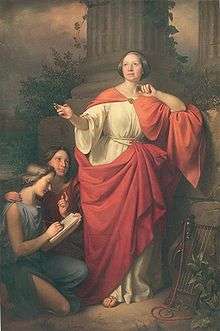Diotima of Mantinea

Diotima of Mantinea (/ˌdaɪəˈtaɪmə/; Greek: Διοτίμα; Latin: Diotīma) is a female philosopher[1] and priestess who plays an important role in Plato's Symposium, her character is defined by metaxy. Her ideas are the origin of the concept of Platonic love. Since the only source concerning her is Plato, it is uncertain whether she was a real historical personage or merely a fictional creation; however, nearly all of the characters named in Plato's dialogues have been found to correspond to real people living in ancient Athens.[2]
Role in Symposium
In Plato's Symposium the members of a party discuss the meaning of love. Socrates says that in his youth he was taught "the philosophy of love" by Diotima, who was a seer or priestess. Socrates also claims that Diotima successfully postponed the Plague of Athens.
In a dialogue that Socrates recounts at the symposium, Diotima gives Socrates a genealogy of Love (Eros), stating that he is the son of "resource and poverty." In her view, love is a means of ascent to contemplation of the Divine. For Diotima, the most correct use of love of other human beings is to direct one's mind to love of Divinity.[3] With genuine Platonic love, the beautiful or lovely other person inspires the mind and the soul and directs one's attention to spiritual things. One proceeds from recognition of another's beauty, to appreciation of Beauty as it exists apart from any individual, to consideration of Divinity, the source of Beauty, to love of Divinity.
Identity of Diotima
The name Diotima means "honoured by Zeus". Her home of Mantinea was an ancient Greek city on the Peloponnese and the site of the largest battle of the Peloponnesian War.
Plato was thought by most 19th and early 20th century scholars to have based Diotima on Aspasia, the mistress of Pericles, so impressed was he by her intelligence and wit. The identity of Diotima is far from resolved, however. Aspasia appears under her own name in Plato's dialogue Menexenus, and some scholars have convincingly argued that Plato did not use false names: therefore, Diotima could be a historical figure.[4]
Influence and use of name
Her name has often been used as a moniker for philosophical or artistic projects, journals, essays, etc.:
- Polish writer Jadwiga Łuszczewska (1834–1908) used the pen name Diotima (Deotyma).
- German poet Friedrich Hölderlin used the pen name Diotima as a moniker for Susette Borkenstein Gontard, who inspired him to write Hyperion. In this work, the fictitious first-person author Hyperion addresses letters to his friends Bellarmin and Diotima.
- Italian composer Luigi Nono used her name as part of the title of his string quartet: Fragmente-Stille, an Diotima, including quotations from Hölderlin's letters to Diotima from Hyperion in the work.
- Diotima is the namesake of one of the main female protagonists in The Man Without Qualities by Robert Musil
- Diotima was the name of Leni Riefenstahl's character in the silent film, Der Heilige Berg.
- Diotima appears in the short poem "Irpen'" by Boris Pasternak.
- Diotima teaches Socrates and Giannina the meaning of love in Giannina Braschi's postcolonial dramatic novel United States of Banana.
- Diotima of Mantinea is one of the two main characters in the novels The Pericles Commission,The Ionia Sanction and Sacred Games by Gary Corby.
- Diotima is the name of New York-based experimental black metal band Krallice's third album.
- Asteroid 423 Diotima is named after her.
- Diotima is used in the sorority Beta Sigma Phi.
See also
Notes
- ↑ Mary Ellen Waithe. "A History of Women Philosophers: Volume I: Ancient Women Philosophers, 600 BC–500 AD". Retrieved November 17, 2012.
- ↑ Ruby Blondell The Play of Character in Plato's Dialogues, Cambridge University Press, 2002, p.31
- ↑ Plato, Symposium, 210a–212b
- ↑ Wider, Kathleen. "Women philosophers in the Ancient Greek World: Donning the Mantle". Hypatia vol 1 no 1 Spring 1986. Part of her argument focuses on the point that all scholars who argued "for" a fictitious Diotima were male, and most used as a starting point Smith's uncertainty of her actual existence (Smith, Dictionary of Greek and Roman Biography and Mythology, 1870).
References
- Navia, Luis E., Socrates, the man and his philosophy, pp. 30, 171. University Press of America ISBN 0-8191-4854-7.